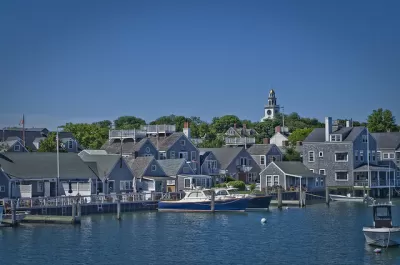A recent Nantucket Town Meeting resolved a long-simmering controversy regarding short-term rentals.

"Nantucket voters on Saturday overwhelmingly rejected proposed restrictions on short-term vacation rentals," reports Joshua Balling.
The short-term rental restrictions provoked serious controversy in the coastal community, as detailed in a Boston Globe article by Tim Logan published in the days leading up to the deciding Town Meeting.
The Town Meeting spanned eight hours, with the numbers dwindling from 900 in attendance at the beginning to 150 at the end, according to Balling. The entire Town Meeting is available to watch (in my viewing, after an advertisement for short-term rental company VRBO) on YouTube.
The controversial amendment, proposed by ACK*Now, "would have established a local rental registry, and set strict limits on the number of days a home could be rented each year – 45 – require minimum stays and restrict the number of people per bedroom and vehicles per property," explains Balling.
The Town Meeting was a busy one—in addition to the vote on short-term rentals, residents also decided against a proposal that would have allotted 25 percent of the $20 million the city budgets for its Land Bank on other affordable housing initiatives. Residents also prohibited pools on lots of less than 7,500 square feet in a number of zoning districts outside the town's downtown and banned gas-powered leaf blowers.
FULL STORY: Nantucket voters shoot down short-term vacation rental restrictions, diversion of Land Bank funds

Alabama: Trump Terminates Settlements for Black Communities Harmed By Raw Sewage
Trump deemed the landmark civil rights agreement “illegal DEI and environmental justice policy.”

Planetizen Federal Action Tracker
A weekly monitor of how Trump’s orders and actions are impacting planners and planning in America.

The 120 Year Old Tiny Home Villages That Sheltered San Francisco’s Earthquake Refugees
More than a century ago, San Francisco mobilized to house thousands of residents displaced by the 1906 earthquake. Could their strategy offer a model for the present?

In Both Crashes and Crime, Public Transportation is Far Safer than Driving
Contrary to popular assumptions, public transportation has far lower crash and crime rates than automobile travel. For safer communities, improve and encourage transit travel.

Report: Zoning Reforms Should Complement Nashville’s Ambitious Transit Plan
Without reform, restrictive zoning codes will limit the impact of the city’s planned transit expansion and could exclude some of the residents who depend on transit the most.

Judge Orders Release of Frozen IRA, IIJA Funding
The decision is a victory for environmental groups who charged that freezing funds for critical infrastructure and disaster response programs caused “real and irreparable harm” to communities.
Urban Design for Planners 1: Software Tools
This six-course series explores essential urban design concepts using open source software and equips planners with the tools they need to participate fully in the urban design process.
Planning for Universal Design
Learn the tools for implementing Universal Design in planning regulations.
Clanton & Associates, Inc.
Jessamine County Fiscal Court
Institute for Housing and Urban Development Studies (IHS)
City of Grandview
Harvard GSD Executive Education
Toledo-Lucas County Plan Commissions
Salt Lake City
NYU Wagner Graduate School of Public Service





























